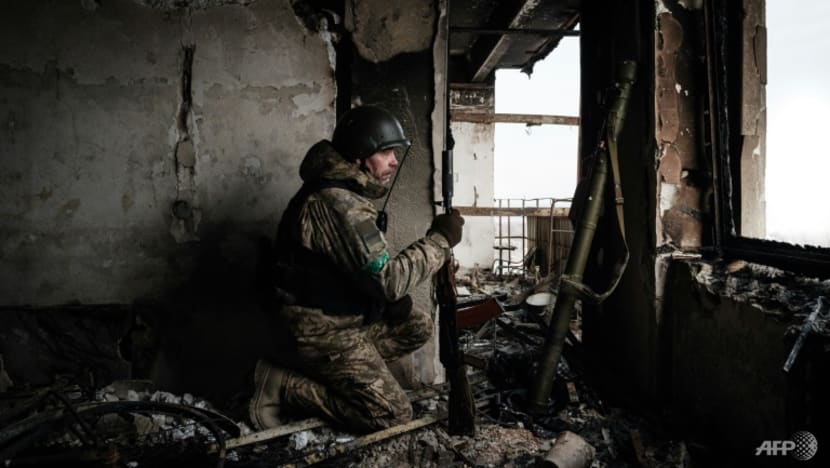With Russia-Ukraine war likely to drag on, both sides face growing risk of aid being drained
Russia’s invasion of Ukraine is approaching the one-year mark. On Feb 24 last year, Russian President Vladimir Putin launched his "special military operation" in Ukraine.

SINGAPORE: With no end in sight to the war between Russia and Ukraine, there could be a risk of humanitarian and military assistance being used up faster than they can be replaced, said observers on Wednesday (Feb 15).
This comes as the invasion of Ukraine approaches the one-year mark. On Feb 24 last year, Russian President Vladimir Putin launched his "special military operation" in Ukraine.
“There is a risk indeed that we will see a growing gap between the needs - what we need to provide vulnerable people with - and the resources available,” said Dr Gilles Carbonnier, vice president at the International Committee of the Red Cross.
On concerns that global headwinds, such as recessionary fears, could lead countries to become more inward-looking, Dr Carbonnier called for countries, including those in the Association of Southeast Asian Nations (ASEAN), “to step up collectively”.
UKRAINE SITUATION IS "EXTREMELY DIRE"
Many people left in Ukraine need some type of relief assistance, he told CNA’s Asia Now. “So, the situation is extremely dire.”
His organisation engages with various parties involved in the conflict to ensure that the “fundamental principles of humanity are respected by all”, which includes protecting the civilians.
“So we have worked with both, of course, the Ukrainian authorities and the Russian authorities. We are in dialogue with the authorities to progress on this very important front to prevent further suffering,” said Dr Carbonnier, adding it has invested heavily in addressing basic needs such as heating during the harsh winter.
Elsewhere, countries such as Afghanistan and Syria are also facing crises that require immediate assistance.
“I think Syria illustrates this well. You have had 12 years of armed conflict, then the COVID-19 pandemic, then a cholera outbreak and now an earthquake,” said Dr Carbonnier on the sidelines of the World Government Summit in Dubai.
The summit brings together thought leaders, global experts and decision-makers from around the world to share and develop policies that are essential in shaping future governments.
“If you're taking the worldwide situation, I think the big challenge is that we see needs for assistance increasing,” said Dr Carbonnier. “With the needs increasing, there is an increasing gap between the needs and the resources available.”
While leaders have expressed concern for the plight of those affected by crises, including the recent Turkey-Syria earthquake, he said this “must translate into effective support”.
“We still have a large, untapped potential of better partnering between humanitarian and development actors, with the private sector and governments, to find out more synergetic ways of scaling up solutions,” he added.
In Ukraine, Russia appears to be preparing for a long war. It has launched a major renewed offensive, days before the first anniversary of its invasion.
RUSSIA PREPARES FOR A LONG WAR
“I think the near-term goal is to try to have some wins on the ground, that can show both the Russian people and also show the international community that Putin's military is more capable than it has shown itself to be over the course of the last 11 months,” said political scientist Ian Bremmer, adding that the aim is to take all of Luhansk and Donetsk.
“That's the intention of this new offensive. Whether or not it will be successful is an open question. Certainly, (Ukrainian President Volodymyr Zelenskyy) understands the existential risks that his country faces.”
Zelenskyy’s intensive lobbying for armaments in recent months is likely an admission “that time is not on his side, that Russia has a much bigger military (and) a much larger economy”.
Dr Bremmer, who is president and founder of global political risk research and consulting firm Eurasia Group, said: “And he needs to continue to get as much support as possible from the United States and from the NATO (North Atlantic Treaty Organization) alliance.
“So far, that support has been extraordinary. Of course, he's concerned that at any point, that might not continue to be the case.”
Touching on China’s refusal to condemn the Russian invasion, he believes Beijing is actually aligned with most countries, “in the sense that they really don't want this war to continue and expand, but they absolutely won't support the United States or the West”.
The Chinese government does not want to be tarred with the same brush as the Russians or the Iranians on the global economy. While it is sympathetic to Russia's position in the war, China has also been engaged in a charm offensive around the world, saying there is still a need to do business with the rest of the world, Dr Bremmer told CNA’s Asia Now.
“They need a level of integration in the global economy to be successful in a way that frankly the Russians no longer have that access nor that possibility.”














